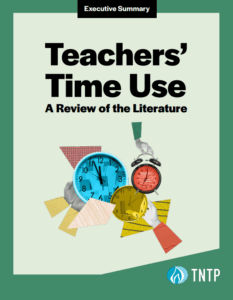No one goes into teaching to get rich. But they don’t go into it hoping to clip coupons and share an apartment, either.
I was recently talking to the superintendent of a large urban district, and he described the kind of profession he’d like to create—one that rewards great results in the classroom, gives teachers a chance to enrich their careers by expanding their influence and leadership over time, and values their contribution to students and community versus credits earned and seat time.
He knows that this is possible, that money exists in the current system to build a better approach. And yet he is also painfully aware that to move the needle on compensation reform will take outsized political capital.
[subscribe]
In virtually any other profession it would take huge political capital to defend the status quo as it exists in public education, not to change it. Imagine the CEO of a Fortune 500 company defending a system where employee pay was 75 percent of the expense base and was being distributed regardless of performance, where many effective employees were leaving within the first five years (precisely when lockstep pay schedules meant their pay was languishing), and where there were almost no opportunities for employees to enrich and further their careers. Not only would that CEO have a lot of explaining to do, but I bet she’d have a hard time attracting or keeping talent, and it’s a pretty good bet that bankruptcy court would be in her future!
And yet as an education profession, as parents, as taxpayers, we rationalize the status quo. We say teachers do not go into the profession “for the money.” And we forgo the opportunity to create the kind of profession that will attract and retain high performers now and for generations to come.
The assertion that teachers aren’t in it “for the money” assumes that they are fundamentally different from other professionals—that they are, in effect, missionaries. It assumes that teachers do not want pay to be adequate and fair, care about earning a competitive wage in a reasonable time horizon, or crave increased challenge, opportunity, influence and autonomy as they progress in their career. It also assumes that teachers are wired so differently, it’s acceptable to ask them to teach an entire generation of students before reaching the top of the salary scale, and rational to structure their pay so that 55 percent of top teachers earn lower base salaries than the average ineffective teacher.
I don’t buy it, and you shouldn’t either. To be sure, great teachers are motivated by the possibility they see in their students, and they find rich rewards in their progress. But when you ask teachers what they want in their paycheck, what they want for career opportunities, it turns out that they are not so different from other professionals after all.
[related]
More than 70 percent of newer teachers—those with 1-10 years of experience—are interested in changing quality-blind compensation and tenure systems, in order to earn a higher salary more quickly. Veteran teachers at the top of the pay scale have little interest in a new approach, but the demographic trends indicate a broad shift. The possibilities are inspiring: After a new pay scale was adopted in District of Columbia Public Schools that allows high-performing teachers to reach a base salary of more than $100,000 in six years, our research found that low compensation is no longer pushing great teachers out the door.
Critics often say that the concept of performance pay is “anti-teacher.” But teachers, like everyone else, have to pay rent and buy their kids’ braces, and they like to take a vacation now and then. To take the position that teachers shouldn’t be rewarded for excelling, that we should continue the status quo, is truly “anti-teacher.”
Professionalizing teaching is not a rhetorical position, it’s a process. Creating the kind of profession that attracts top graduates—not only as a hiatus before starting their “real careers,” but in its own right, alongside lawyering, business, engineering, and so forth—will require taking action. We will have to let go of some things, like the civil service step-and-lane salary model. But in return, we’ll have the opportunity to create the kind of profession that attracts our best and brightest, for generations to come.








